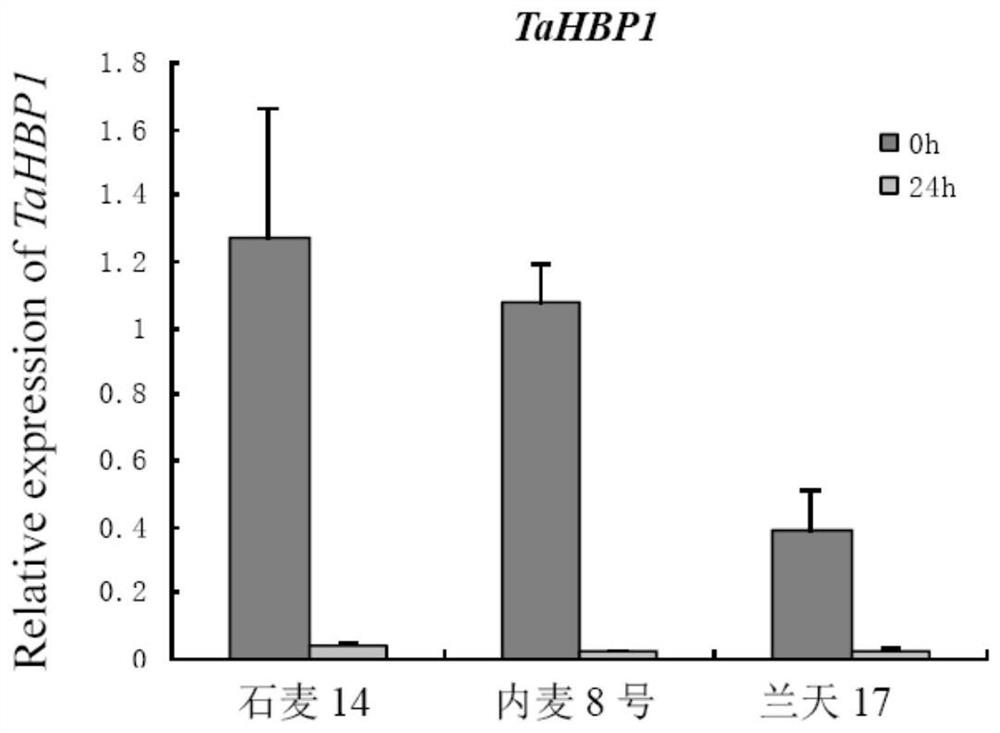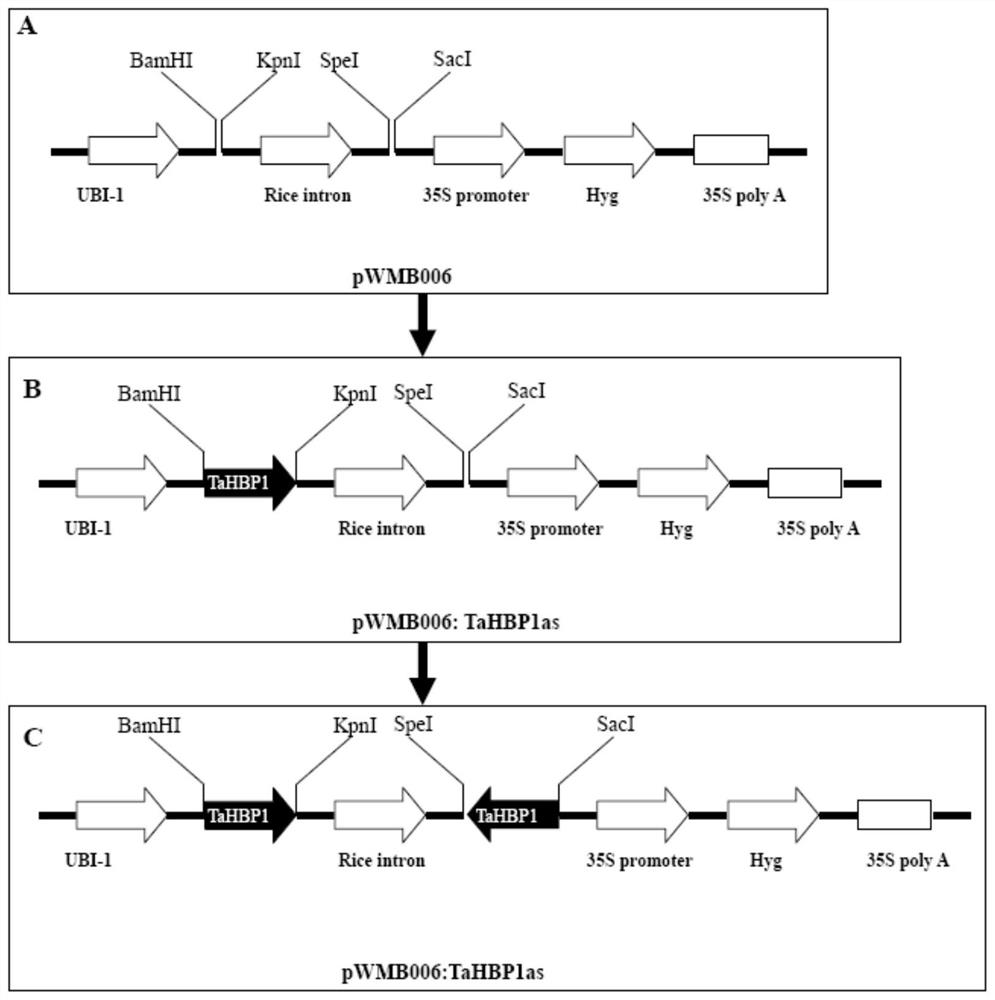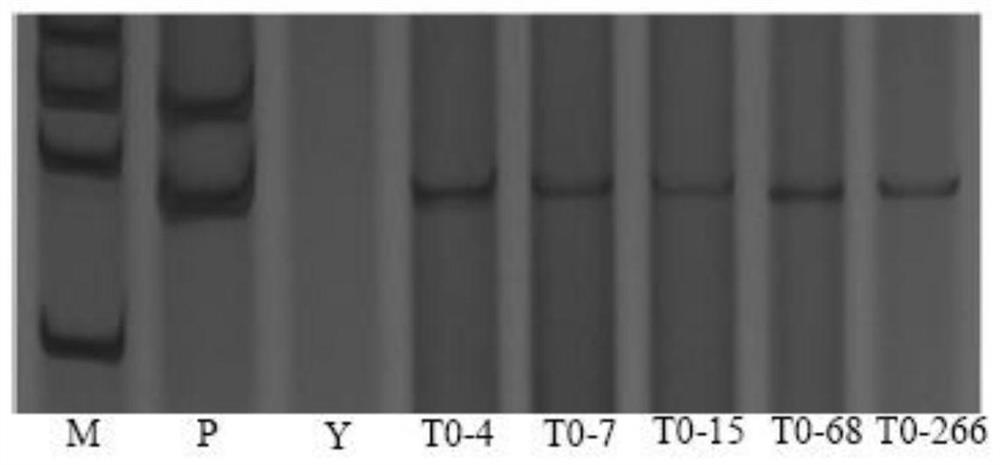A hemopexin gene tahbp1 and its recombinant interference vector and application
A technology that interferes with vectors and genes, applied in the field of genetic engineering, can solve the problem of lack of wheat powdery mildew genes, and achieve the effect of improving powdery mildew resistance and improving resistance
- Summary
- Abstract
- Description
- Claims
- Application Information
AI Technical Summary
Problems solved by technology
Method used
Image
Examples
Embodiment 1
[0023] Example 1 Cloning of the gene TaHBP1 with a heme-binding domain induced by powdery mildew in Yangmai 158
[0024] Nannong 9918 is a new disease-resistant, high-yield, high-quality wheat variety selected from Yangmai 158 / 92R137 / / Yangmai 158 by the Institute of Cytogenetics, Nanjing Agricultural University, using modern biotechnology and conventional breeding technology (Chen Peidu, Zhang Shouzhong, Wang Xiu'e, Wang Suling, Zhou Bo, Feng Yigao, Liu Dajun. Nannong 9918, a new wheat variety resistant to powdery mildew and high yield. Journal of Nanjing Agricultural University, 2002,25(4):1438-1444), SM-1 is Nannong 9918 EMS susceptible mutants (Xing L, Hu P, Liu J, Witek K, Zhou S, Xu J, Zhou W, Gao L, Huang Z, Zhang R, Wang X, Chen P, Wang H, Jones JDG, Karafiátová M, Vrána J, J, J,Tian Y,Wu Y,Cao Pm21from Haynaldiavillosa Encodes a CC-NBS-LRR protein conferring powdery mildew resistance inwheat.Molecular Plant,2018 11(4):874-878), broad-spectrum high resistance to whea...
Embodiment 2
[0027] Example 2 Expression analysis of TaHBP1 in resistant Nannong 9918 and susceptible Yangmai 158
[0028] In order to study whether TaHBP1 is also down-regulated by powdery mildew in other disease-resistant materials, the disease-resistant wheat varieties Shimai 14 (publicly known and public, Jishenmai 2004005) and Neimai 8 (publicly known and public) containing the powdery mildew resistance gene Pm21 were used. , Chuan Shenmai 2003003), Lantian 17 (commonly known and public, Ganshenmai 2005011) were induced by powdery mildew for 0 and 24 hours by RNA reverse transcription cDNA as a template, using P3 (TGAAGCGTGAGGAGGAGTAC, SEQ ID NO.5) and P4 ( AGAGATTTCCGCAACCTGGA, SEQ ID NO.6) was used as a primer for real-time fluorescent quantitative PCR (Q-PCR) analysis. The PCR program is as follows: the PCR reaction is amplified on a real-time fluorescent quantitative PCR instrument (MyIQ, Bio-Rad Company, USA) and the fluorescence is detected. The 20uL PCR reaction system contain...
Embodiment 3
[0029] Example 3 TaHBP1 interference vector pWMB006:TaHBP RNAi build
[0030] RNAi Vector pWMB006:TaHBP1 Interfering with TaHBP1 Gene Expression RNAi The starting carrier is pWMB006 (Tingting Chen, Jin Xiao, Jun Xu, Wentao Wan, Bi Qin, Aizhong Cao, Wei Chen, Liping Xing, Chen Du, Xiquan Gao, Shouzhong Zhang, Ruiqi Zhang, Wenbiao Shen, Haiyan Wang and Xiue Wang.Two members of TaRLK family confer powdery mildew resistance in common wheat. BMC Plant Biology 2016 16:27 DOI:10.1186 / s12870-016-0713-8). The construction process is as follows: 1. Using the cloned TaHBP1 gene sequence as a template, design primers P5 (TTGGATCCTGAAGCGTGAGGAGGAGTAC, SEQ ID NO.7) and P6 (TTGGTACCAGAGATTTCCGCAACCTGGA, SEQ ID NO.8), and P5 has a BamHI restriction site point, P6 has a KpnI restriction site. 2. Using the plasmid containing the TaHBP1 gene as a template, PCR amplification was performed using primer pairs P5 and P6, and the amplified fragment was recovered. 3. Digest the amplified product w...
PUM
 Login to View More
Login to View More Abstract
Description
Claims
Application Information
 Login to View More
Login to View More - R&D
- Intellectual Property
- Life Sciences
- Materials
- Tech Scout
- Unparalleled Data Quality
- Higher Quality Content
- 60% Fewer Hallucinations
Browse by: Latest US Patents, China's latest patents, Technical Efficacy Thesaurus, Application Domain, Technology Topic, Popular Technical Reports.
© 2025 PatSnap. All rights reserved.Legal|Privacy policy|Modern Slavery Act Transparency Statement|Sitemap|About US| Contact US: help@patsnap.com



